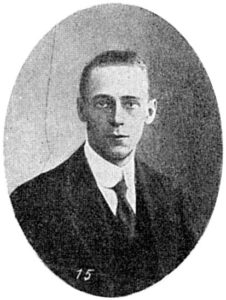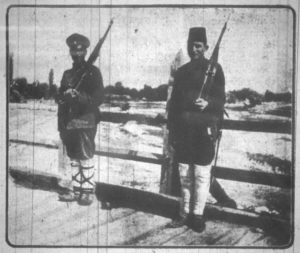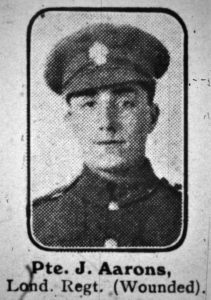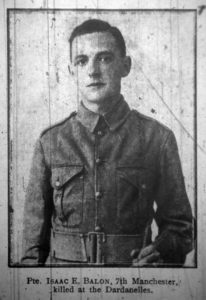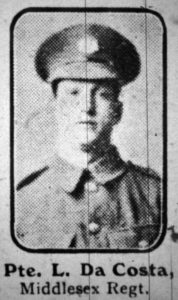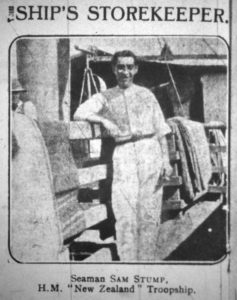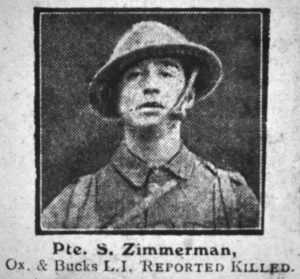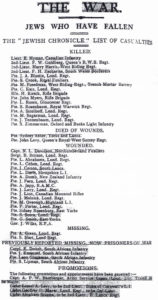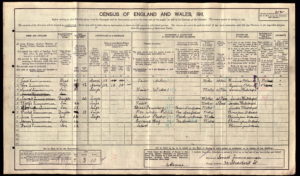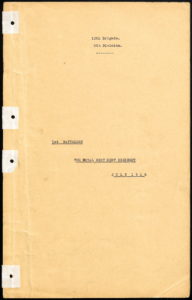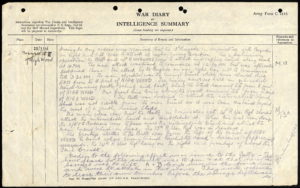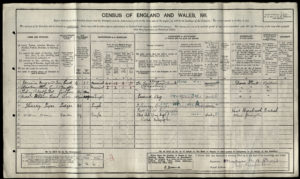By August of 1915, slightly over a year had transpired since the Great War’s beginning. The war’s unprecedented effects, awareness of which had by now become apparent to all observers, would continue through the subsequent three years. (And, beyond.)
By this time – as evidenced through examples of news items and investigative reports in the Jewish and general news media – information about the dire situation and appalling treatment of Jewish civilians in the Eastern War Zone, particularly in Poland, amidst the advance and retreat of armies of the Central Powers and Allies (well, the latter specifically being Imperial Russia), had become readily available. By August, 1915, evidence of this – vastly more than mere anecdote and rumor – had reached such a level of pervasiveness, depth, and consistency that on August 13 The Jewish Chronicle published the editorial, “If It Be True… A Terrible Indictment Against Russia”, which was simultaneously news analysis, an opinion piece, and a tempered voice of alarm and outrage.
The editorial was authored by “Mentor”, under whose name innumerable essays, musings, and thought pieces – often focused upon Jewish Nationalism – were published in the Chronicle during and after the Great War. I’m not familiar enough with the history of The Jewish Chronicle to know if “Mentor” was a moniker for the newspaper’s publisher or chief editor, a pen-name under which the writings of multiple individuals appeared under ostensible authorship of one person. Or even, if “Mentor” was a member of the Jewish community not actually on the staff of the Chronicle. Given the consistency of both Mentor’s wonderful literary style, and the consistent themes and opinions of his essays and editorials, I think the most likely simplest explanation is the simplest: Mentor was one person.
In any event, Mentor’s essay concerning the treatment of Jewish civilians by the Russian Army is careful and tempered; analytical and measured; powerful and impassioned. Notably, he doesn’t actually address the issue at hand until well (well!) into the body of his essay, devoting his first four paragraphs, in tones almost abstract and academic, to concerns about the very propriety of expressing thoughts that might be construed as being even remotely critical of any aspect of the war’s conduct. This is expressed in light of the mood of the British public, the necessity of not impinging upon relations between Britain and Russia under the imperative of maintaining the Triple Alliance, and possible (though unarticulated) fears about the perception of the “loyalty” of British Jewry, as perceived via criticisms of an ally of Britain – Czarist Russia – expressed in the Chronicle.
The predicament being, how does one criticize his country’s ally, when that ally, through policies emanating from the highest positions in its civilian and military leadership, is treating one’s people – to use the apt word – “abhorrently?” Specifically, “What has to be said here about Russia, about an Ally of this country, must be confessed to be singularly abhorrent reading, the more abhorrent because Russia is the country’s Ally. For my part, however, I cannot believe that a clear statement of the matter to which I feel it incumbent to draw public attention, such as will be attempted, is in the remotest sense traitorous, for it is written in loyalty to truth. I cannot believe the British Government, allied though it be to the Government of Russia, will so deem it. Loyalty to truth, the denunciation of infamies, even when committed by the friends and allies of this country, cannot be disloyalty to England – the fount of honor, the palladium of freedom.”
In the central part of his essay, Mentor presents the reader with accounts of the Russian military’s forced deportation of Jews from Galicia and Bukovina – who astonishingly included Jewish soldiers of the Russian army who’d been recuperating from their wounds, let alone children and the aged. This is followed by accounts of the immediate reaction to these events and policies by members of the affected Jewish communities, and, subsequently, by “prominent” members of Russian Jewry (named not indicated), the latter of which eventuated in the orders for deportation being annulled, albeit conditionally.
In the essay’s concluding paragraphs, Mentor focuses upon the origin of the Russian government’s policies vis-a-vis Jews, and other subject nationalities, imputing that the former arises (and has arisen…) through the influence of “German anti-Semites and German anti-Semitism,” seemingly casting greater responsibility for these events indirectly on Germany, rather than directly on Russia.
He then concludes his thoughts with the same focus – and the same concerns – with which the essay began: Upon the concept of Loyalty. (Capital “L” loyalty, that is.) For if loyalty there be, it can neither be one-sided, nor unreciprocated.
________________________________________
________________________________________
“They were not soldiers on the battlefield in the conventional meaning of the term, but they were true soldiers on life’s battlefield, fighting an unequal contest against overwhelming odds. And they refused their liberty, their freedom, their lives, their homes, because these could be gained only by a demeaning condition; they preferred exile to a dishonoring pact “inconsistent with the dignity of Judaism”.”
“IF IT BE TRUE…”
A Terrible Indictment Against Russia
The Jewish Exponent
August 13, 1915
“Mentor,” in The Jewish Chronicle
(Reprinted from The Jewish Chronicle of July 30, 1915)
IT IS a commonplace of the world-struggle which in a few days will have been raging for a whole year that the sufferings caused by the war have fallen more heavily upon Jews than upon any other section of the population involved. Perhaps, however, the very hardest measure that has been dealt out to the Jews has not been the direct effects of battle. The hardest measure has been the persistent suspicion that has been leveled at them on all hands. The hardest measure has been that Jews who, as a people, have the fault, if such could really be deemed a fault, of being abnormally loyal, even loyal to excess, have been pilloried as treason-mongers. That there are black sheep in every flock, and that there are Jews who will stoop to treasonable practices must necessarily be in a body so distinguished for loyalty as are our people.
It is the way of nature to produce abnormalities. But the loyalty of Jews to the land of which they are citizens has been proved in a thousand fires. That loyalty cannot be purchased nor suppressed. It is the way of the Jew, a part of his being, the very essence of his psychology. The loyalty of the Jew is not confined to material considerations. His history is in itself a demonstration of his loyalty to great principles and to the greatest of all – to Truth. For his métier has been, and is, to be a passive if not an active witness of Truth before all the world. For that he has suffered, for that he suffers, and for that he will suffer till the end of the variegated chapter which he is contributing to the history of mankind.
What I am about to say may possibly be deemed by some, mostly of the shallow and the unthinking, to be in some way disloyal when measured by their notions of patriotism. Patriotism, especially in the stress and storm of wartime, however, takes unto itself remarkable contortions. Men and women – of both sexes – lose even their average balance of intellect as soon as the war drum begins to throb. Their anxiety to prove their patriotism – who prove what ought never to be in question? – impels them to the most extraordinary devices for satisfying this aspiration, so that they come to mistake for patriotism what is mere hysteria. We are at war with the German nation, and, according to some of these unbalanced souls, the mere fact that we are at war with that people is proof that every individual of them is devoid of every scarp and vestige of qualities that are virtues and has become endowed with every quality which is vicious and evil. Equally because in the political whirligig England has become allied to certain Powers, the people of those countries possess, according to these hysterical patriots, all the virtues. It never crosses the mind of these people that these very allies could have ever been at enmity with England – as Russia was very recently, as France was for generations – at enmity and subjected to the same unreasoning prejudice of this worthless sort of self-styled patriot. This “cockeyed” patriotism helps not even a little bit, it hinders greatly. This patriotism runs mad and will never win a war. The “Hymn of Hate” has been a deterrent to German in the prosecution of her campaign as lack of munitions is said to have been to the Allied Powers.
Wars are matters of great moment, requiring the true patriot to cultivate a broad outlook and wide purview. The belligerent nation, the citizens of which indulge in petty scrapping worthy of garrulous washerwomen, is handicapped in carrying on vast operations of great pith and moment. Patriotism – true patriotism – neither gags nor blinds. Patriotism – true patriotism – is no enemy of the truth. If we see clearly the virtues which exist in our enemies and the vices in our friends, we are all the better equipped for carrying on such a struggle as that in which we are now engaged. I may be denounced as unpatriotic because of what I am about to say of Russia and the Russian Government. Some, more hysteric and unbalanced than others, will perhaps seek to pillory me as traitorous. But loyalty to truth is the first call upon the true patriot. To suppress all record of infamies because they are charged against the country’s friends is as disloyal to truth as would be the disseminating of false accusations against them. What has to be said here about Russia, about an Ally of this country, must be confessed to be singularly abhorrent reading, the more abhorrent because Russia is the country’s Ally. For my part, however, I cannot believe that a clear statement of the matter to which I feel it incumbent to draw public attention, such as will be attempted, is in the remotest sense traitorous, for it is written in loyalty to truth. I cannot believe the British Government, allied though it be to the Government of Russia, will so deem it. Loyalty to truth, the denunciation of infamies, even when committed by the friends and allies of this country, cannot be disloyalty to England – the fount of honor, the palladium of freedom.
Almost from the beginning of the war, stories have come to hand of Russian cruelties toward our people. The Pope, in the course of a newspaper interview, recently rather more than hinted at them. Reference to some that had been told to us here, were mentioned in this column a few weeks ago. The source from which most of them that have reached this country were derived has, however, necessarily demanded extreme caution, if it has not imposed some suspicion. It has been difficult, as was explained, to disentangle the false from the true, to measure aright what was fact and what was exaggeration. It was difficult, too, to determine how much was more than – and in heaven’s name it was enough! – the necessities of military operations – the dire demands of the war, and how much was cruelty practiced upon our people under the guise of military necessity. For the most part, the inclination has naturally been to give to the Russian Government as an ally of this country the benefit of the doubt, and in view of the general situation not to say a word upon such material as came to hand that would be embarrassing to an ally fighting side by side with England. But there are limits. And the limit is reached when silence involves traitorousness to truth. Facts which have been detailed to the present writer by friends in whose impartiality and veracity he could have nothing but perfect confidence, are backed up and confirmed to a large extent by an official document, an Order of the Day, issued by the Russian Government. This Order seems to have been promulgated in March last. It decreed nothing less than the expulsion of all Jews from the military zones in Galicia, Bukovina and Poland. The excuse for this terrible determination was an easy one to find ready to hand. It was the alleged disloyalty of the Jewish population. That allegation, needless to say, could have been based at most upon the treason of a few individuals. But the Russian Government, bettering Burke, indicted a whole nation. The decree, too, was directed not at any locality, or at any general section of the population. It was a decree against Jews as Jews.
And now we have the result. Some two hundred thousand Jews who had been living in the confines of Kovno, Kurland and Suwalki were exiled by the Russian authorities, so that, in the technical language employed, those districts might be “evacuated of Jews.” Our unfortunate brethren upon whom this decree fell were compelled to obey it by a short notice, varying from eight hours to thirty at the most. In that time two hundred thousand people had to leave their homes, their possessions, their all, and face – they knew now what! What followed requires the pen of Dante adequately to narrate. Not one Jewish soul of all this vast population was allowed to remain, so that towns which had contained a large proportion of Jewish inhabitants were deserted. Aged men, little children, women – even those hourly expecting to become mothers – some clutching to their breasts their newborn babes; people insane, cripples, the blind; those who were sick unto death – there was no exemption for any. The decree, it must be admitted, had at least the merit of impartiality. For not only were the families of soldiers fighting at the front doomed by it, but soldiers who had received permission for furlough in their native towns, and soldiers, whose bleeding wounds were still unhealed, the Jewish nurses who attended them in the local hospitals, and even the Jewish military doctors – all had to go into exile. Even the rage and fury of battle respects the Red Cross. Sheltered beneath that symbol are the wounded in war, and those who are attendant upon the soldiers who have fallen. But this decree tore away Jews whose condition entitled them to safety as if shielded by the sacred sign from the terrors of belligerency, and it sent them with their brothers and sisters into exile. No wonder we read that the poor people were maddened unto despair; that they turned and destroyed their goods and chattels, their household goods or generations, preferring to leave behind them the ruin of their property rather than it should fall into the hands of the despoilers.
It were futile to attempt to describe with anything like competences what this horrible decree meant to the two hundred thousand poor Jews upon whom it fell. But the Order for their expulsion was not the end by any means of the horrors which awaited them. For the conveyance of these people from their homes to some far distant Eastern province, there were provided some twenty-six “extra trains,” as they were called. Each of these “trains” consisted of from forty to seventy wagons into which were huddled pell-mell this population of misery. The poor people had been able to take with them only a few of the most necessary of their possessions, and there in these “trains” they were crowded together – men, women and children of all kinds “well-to-do people and professional beggars,” as my correspondent puts it, “sound persons and infectious patients, all of them thrown together in this living load.” None of them knew whither they were going. With exquisite regard for the sufferings of their exiled passengers, the slow moving “trains” were not allowed to stop at stations where food could be supplied to the poor wretches. The “trains” could stop only at a distance of at least one kilometer from any station. But the poor stricken people who were carted away in these “trains” were perhaps not much worse off than the thousands upon thousands for whom the “trains” had no accommodation, but who had to leave none the less. In every sort of conveyance for which, of course, extortionate prices were demanded, these people rumbled away along the roads; or footsore and weary they tramped along outside the forbidden war zone. Like an avalanche of human misery, they came into towns already filled with populations in which poverty ruled. Cellars, barns, outhouses – every nook and cranny was filled with this exiled population. Even the synagogues were turned into doss-houses. These destitutes had to beg for sheer life; they could, however, appeal only to the charity of the pauperism into which they were driven. But above all they were forced to galling personal grief. For in the suddenness of the exile to which they were compelled, families became separated. Wives and their husbands, brothers and sisters, and little children were parted from their mothers. Some were sent here, others were sent there, with regard to nothing save the capacity of the “extra trains,” or the availability of other means for conveyance all was subservient to the one idea that the war-zone districts must be evacuated of Jews. To such an extent did this misery of missed relatives occur, that special inquiry offices had to be established at several points outside the war zones by Jews for the purpose of recovering lost persons. What life was like upon the “extra trains” can as little be imagined as described. In at least one case the “extra train” was not allowed by the local authorities to go into the station for which it was destined. The consequence was that the poor people, still huddled in these wagons, were compelled to return hundreds upon hundreds of miles. They were not allowed to remain; they went sent back to their destination! Thus they were hunted backwards and forwards for five weeks. Twenty-eight of the poor passengers became insane through their sufferings; typhus broke out in the “extra train”’ and death – cruel, lingering death – was the only mercy that is seemed to the harassed victims would be shown them by a fate against which they were powerless. Let me break off for a moment here to remind the reader that this is a mere bald recitation of human suffering in Europe – it is not an imagined picture of the doomed in hell. Nor was it suffering inflicted by an invading army upon enemies. The victims were not belligerents. They were civilian citizens of Russia herself – save those who were Russia’s soldiers, some bearing the wounds and the hurts of Russia’s combat.
Now, let us see what sort of disloyalty reigned in the breasts of these hunted and harassed Jews. The boldest and bravest of men could well have been cowed into submission, into yielding up well-nigh every principle that honor, loyalty and courage demanded, after having suffered as these people had suffered. But, notwithstanding everything, we find them possessed of a spirit which in the circumstances it would be difficult to discover among average men and women. Listen to this! After the “evacuation” had taken place, several Jewish organizations made urgent representations to the Russian Ministers in behalf of the expelled Jews. Deputations of prominent Jews waited upon the ministers, and at last, after some days had elapsed and the exile had been effected, a promise was given that the whole measure was to be annulled. To be annulled! As if the mischief could be undone! However, if it meant anything, it meant that the poor people could go back to their homes, back to the ruins of them that they would find, and there on their native soil begin again their hard, bitter lives. It thus meant release from exile for them. But the Military General Governor into whose hands the decree of annulment seems to have been placed, declared that the return of Jews to their homes could be sanctioned only on condition that they gave to the military authorities hostages from the ranks of their rabbis and the influential and better off among them. He added that the population was to understand that, in case there was the smallest treason discovered on the part of any Jews, the hostages would be hanged. The deputation to whom this information was conveyed in turn communicated it to the Jewish exiles. These met together to discuss what they should do. The conferred for three days, and then these “traitorous Jews,” these despised exiles, these men and women who had suffered every horror, who had faced every indignity, who had borne every insult and all the pains and penalties of this wicked murderous evacuation – these men and women came to this decision: that “we reject the government’s proposal because of the condition under which alone they will grant it, for it is not consistent with the dignity of Judaism!”
These then were the sort of “traitors” that the Russian Government hunted and hounded in its “evacuation”. This was the sort of spirit that filled these people. They were not soldiers on the battlefield in the conventional meaning of the term, but they were true soldiers on life’s battlefield, fighting an unequal contest against overwhelming odds. And they refused their liberty, their freedom, their lives, their homes, because these could be gained only by a demeaning condition; they preferred exile to a dishonoring pact “inconsistent with the dignity of Judaism”. One almost feels something of gratitude to the Russian Government for having been the means of showing the sort of stuff of which the people to whom they dare thus to persecute are made. To the terrors of war we have become so inured that many will read the story of this “evacuation” of Jews from the war zone, it is difficult to believe, without a shudder, but it may be with but a passing shudder. They will relegate it to the grim and awful catalogue of the terrors of war time. But the information which comes from Russia shows that this wholesale baiting of Jews is likely to go on. Already there are fears that the Jews in the other districts are likely to be deported, and meetings have been held both in Petrograd and the provinces in view of the threatened danger. There again the fine spirit of our people has become manifested. They have refused to purchase their liberty under any such degrading conditions as giving hostages for their good behavior. It is said, too, that side by side with this threatened fresh exile – and this exile, recollect, means deportation for perhaps hundreds of miles – there are rumors which seems at least to have some solid basis, that from high quarters there has been issued an order for the collection of anti-Semitic material against Jewish soldiers. We know what that means, and we know, too, that every untoward incident in which any individual Jews may become involved will be employed to the full to the hurt of Jews in general.
The sole responsibility of Russia and the Russian Government for their conduct towards Jews and other subject nationalities has been more than once contested in this column. The influence of German anti-Semites and German anti-Semitism has been an element which could not be overlooked. There is nothing that has occurred to shake the opinion that the root of the trouble of the Jews in Russia is to be found in Germany. This awful narrative may be taken, therefore, as the full fruit of that country’s influence in Russia. It will not tend to tire any who read it, of the task which this country has undertaken because it is told of one of this country’s allies. It will, it is hoped, make men see all the clearer the necessity for ridding Russia from German influence, in the hope that thereby the conditions for our people, and others in Russia, who are subjects of the Czar, may be bettered. Germany’s responsibility, great or small, however, does not excuse nor palliate the wickedness, the infernal, devilish wickedness of such doing as were involved in the “evacuation” of Jews in the war zones and which have here been set down. Is the story untrue? Then, the Russian Government has the means of denying its truth and of giving proof of its incorrectness. If it be true, then loyalty to truth which nothing ought to depose as the highest duty, demands that the facts shall be known even though Russia is an Ally of this country. It is as necessary as if forgive the bare suggestion – these horrors were the work of the Government of England itself. For if the alliance between Russia and England imposes upon English citizens an obligation towards Russia, surely that same alliance imposes upon Russia a like obligation to England. Deeds such as those narrated must be painful and disgusting to the liberty-loving Englishman. They must prejudice the cause of the allies by influencing the opinion of neutral lands. They must be painful and disgusting beyond words to England, which stands before the world as the protector of humanity, the shielder of the weak, the avenger of the outraged.
The obligation is, of course, upon us here in England, upon all the subjects of the King, to do nothing to shake in the least firmness of the alliance between this country and Russia. We English Jews, not only out of loyalty to the country we love, but because we believe that the highest Jewish interests, too, lie in that direction, are anxious above all things to uphold, support and strengthen that alliance, so that England may triumph in the war she is waging. In deference to that feeling, we have been willing, if not to forget, at least to forgive Russia’s past towards our people, to utter not a word in respect to their civil and political wrongs pending the war; to be content with the hope and the belief that the end of the war will begin the end of disabilities which they have borne. But this loyalty to the alliance between England and Russia, this loyalty to the allies cannot be one-sided, and must not be abused by Russia. To persecute Jews as Jews have been persecuted by the decree of “evacuation” from the war zones, to expect that this foul deed can be effected and that Jews – in England – can be dumb and utter not a word because of Anglo-Russian relations, is an abuse of the principles underlying the alliance. It cannot be an element in any alliance into which a freedom-loving country such as England would enter.
Thus perhaps after all, the gravest charges against her involved in this “evacuation” crime is that Russia by her acts against our people has herself been disloyal to the Triple Alliance. Writing as I do in England as an English born citizen of this beloved country, the aspect of the matter naturally appeals to me as it affects England only. Yet let us not forget that the third element in the Triple Alliance is the fair country of France wedded to the high ideal of “Liberty, Equality, Fraternity”. Her sons, like England’s, are bleeding upon the battlefield in defense of these high ideals which England and France hold in common. While they are dying for the undying cause of those ideals Russia, by her treatment of her Jewish subjects, is trampling those ideals in the very dust.
References and Suggested Readings
Lohr, Eric, The Russian Army and the Jews: Mass Deportation, Hostages, and Violence during World War I, Russian Review, V 60 N 3, July, 2001, pp. 404-419 (JSTOR)
1914-1918 Online: International Encyclopedia of the First World War, Lists the following references, in Dr. Semion Goldin’s* essay, “Antisemitism and Pogroms in the Military (Russian Empire)“:
Anonymous: Iz chernoi knigi russkogo evreistva. Materialy dlia istorii voiny 1914 – 1915 godov (From the black book of the Russian Jewry. Materials for the history of war 1914-1915), in: Evreiskaia starina 10, 1918, pp. 195-296
Gessen, I.V. (ed.): Dokumenty o presledovaniach evreev (Documents on persecutions of the Jews), in: Arkhiv russkoi revoliutsii XIX, 1928, pp. 245-284
Holquist, Peter: The role of personality in the first (1914-1915) Russian occupation of Galicia and Bukovina, in: Dekel-Chen, Jonathan L. (ed.): Anti-Jewish Violence. Rethinking the Pogrom in East European History, Bloomington 2010: Indiana University Press, pp. 52-73
Lowe, Heinz-Dietrich: The Tsars and the Jews. Reform, Reaction, and Anti-Semitism in Imperial Russia, 1772-1917, Chur 1992: Harwood Academic Publishers
Sanborn, Joshua A.: The Genesis of Russian Warlordism. Violence and Governance during the First World War and the Civil War, in: Contemporary European History 19/3, 2010, pp. 195-213.
* The Leonid Nevzlin Research Center for Russian and East-European Jewry, The Chais Center for Jewish Studies in Russian, The Hebrew University



